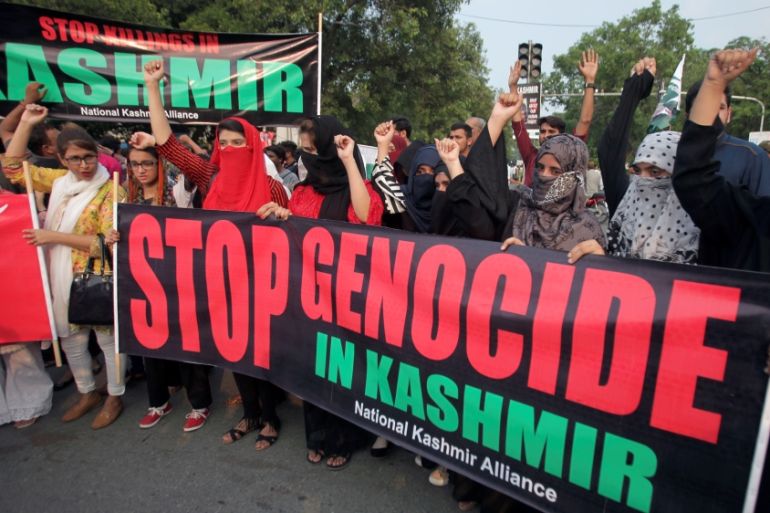India’s Kashmir move may face legal challenges: Experts
Lawyers and experts question legality of Indian government’s decision taken while the state was under central rule.

India‘s move to strip Kashmir of special rights is likely to face legal challenges, constitutional experts and Supreme Court lawyers said, with some questioning the legality of the route used to make the change.
On Monday, Home Minister Amit Shah announced in parliament that the government would scrap the constitution’s Article 370, which grants special status to Jammu and Kashmir state and allows permanent residents rights to property and government jobs.
The revocation of the Himalayan territory’s special status is being seen as a bid to fully integrate its only Muslim-majority state with the rest of the country.
To do so, the government used a provision under Article 370 of the constitution that allows the law to be tweaked by a presidential order – provided there is consensus in the constituent assembly of Jammu and Kashmir.
One problem, though, is that the constituent assembly of the state was dissolved in 1956.
“They [the government] have not just struck down the provision of 370, but they have actually dismantled the state of Jammu and Kashmir as it existed in the Indian constitution,” Ajai Shukla, a defence analyst in New Delhi, told Al Jazeera.
“It now consists of union territories which are centrally governed – Ladakh and Jammu and Kashmir. This is a sort of a radical new provision, which many people are saying will require a constitutional amendment,” he said.
The government has tweaked another constitutional article so that a reference in Article 370 to “constituent assembly of the state” becomes “legislative assembly of the state”. The legality of that move, the lawyers said, could be questioned in court.
‘Legal faultline’
New Delhi said all the changes were agreed to by the state government. And that, some lawyers say, could be another issue for the government of Prime Minister Narendra Modi as there currently is no government in Jammu and Kashmir.
For the past year, the state has been under presidential rule, after Modi’s Hindu nationalist Bharatiya Janata Party (BJP) pulled away from an alliance with a regional party and dissolved the state assembly.
“If there is president’s rule, then how does that work? Does it fulfil the requirement?” senior Supreme Court advocate Akhil Sibal told Reuters news agency. “That, to my mind, would be the legal faultline.”
|
|
Malavika Prasad, a constitutional lawyer, said: “How did the government of Jammu and Kashmir concur with the changes if the state has been under presidential rule for a year now?”
Shah said earlier on Monday that the changes would pass “every legal scrutiny”, but lawyers said they expect several petitions challenging India’s changes to Article 370.
One group of lawyers in New Delhi is already working on a possible petition, a lawyer told Reuters.
“The first legal challenge will come from Kashmir itself. All of Kashmir is now on one side, including the secessionists and nationalists; everybody is outraged,” said Shukla, the defence analyst.
“In India as well, there will be mounting legal challenges and political opposition, which has many illustrious lawyers. It can be expected that these will be heard by a constitutional bench in the Supreme Court.”
There could also be legal objections to related government legislation concerning the division of Jammu and Kashmir into two entities, including a separate Buddhist-majority, sparsely-populated mountainous territory, Ladakh. That law will rely on the constitutional changes made on Monday.
‘Major tipping point’
Critics of Modi’s government and the BJP have accused it of changing the constitution to shift Jammu and Kashmir’s demographics – it is currently majority Muslim – as well as to pander to its Hindu nationalist base, which has long demanded the right to own property in Kashmir.
Experts and analysts believe the move could have serious consequences for the entire region.
“There will be fear of a change in the demographic profile of Jammu and Kashmir that will sow more despair among the people and a sense of deprivation and disempowerment will be engrained further,” Kashmiri journalist Iftikhar Gilani said at a panel on South Asian politics in Turkey’s capital, Ankara.
“When you discredit moderates, you will encourage radicals. When you reduce humanity to a spectacle, you create a dehumanised society,” he said.
The revocation of #Article370 is a major tipping point for an already-fraught dispute. It’s hard to overstate the magnitude of this move.
— Michael Kugelman (@MichaelKugelman) August 5, 2019
Since 1947, Jammu and Kashmir has enjoyed special provisions to enact its own laws. The provisions also protected its citizenship law, which did not allow outsiders to settle in or own land in the territory.
The Himalayan region is held by India and Pakistan in parts and claimed by both in full. New Delhi’s action provoked condemnation in Pakistan, which has disputed India’s control over Kashmir for decades.
Since they were partitioned in 1947, the two countries have fought wars in 1948, 1965 and 1971 – two of them over Kashmir.
Speaking at the same panel in Ankara, Umer Karim, a research fellow at the Royal United Services Institute in London, said India’s latest move “will only create further instability in the region and will further escalate tensions between the two sides”.
Michael Kugelman, deputy director of the Wilson Center in Washington, DC, tweeted: “The revocation of Article 370 is a major tipping point for an already-fraught dispute.”
Some Kashmiri groups in the disputed region have been fighting against Indian rule, aiming for independence or unification with neighbouring Pakistan.